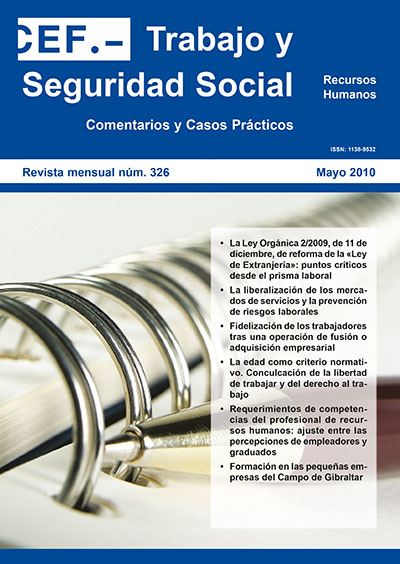Small-sized enterprises, do they train their employees? Reflections based on a study among small-sized enterprises located in the region of Campo de Gibraltar, determining subgroups by their size
DOI:
https://doi.org/10.51302/rtss.2010.5305Keywords:
personnel training, small enterprises, qualitative aspects of the training, financial aid for training, limitations on personnel training, Campo de GibraltarAbstract
This paper incorporates part of the findings of a research study on the training and qualification of personnel in small businesses in the Cadiz region of Campo de Gibraltar. We analyze the volume of those enterprises which offer professional training to their personal, and in this case, what are the quality conditions of that training, because there is no real training policy without contemplation of such actions.
Based on that they were born with the aim of assisting the small business in this policy, we give attention to the knowledge, and, where appropriate, to the use of the aid to continuing education, both through the extinct National Continuing Education Agreement, –initiatives and periods that were used, the degree of coverage on the workforce, main training methods and subjects–, and through the use of the credit system of training in the new rules in Spain contained in the RD 395/07 on training system for employment, and that began with the RD 1046/03, on subsystem of continuing training.
Finally, we show the more significant comparative results among the three types of companies that have differentiated into the group of small enterprises of our survey.
Downloads
References
Aventur, F., Campo, C. y Möbus, M. [2001]: «Los factores de desarrollo de la formación continua en la Europa de los quince». Calificaciones & Empleo. Piette/Céreq, n.º 31, págs. 1-4.
Barranco, F.J. [1993]: Planificación estratégica de Recursos Humanos. Del marketing interno a la planificación. Editorial Pirámide, Madrid.
Barrios del Pino, I., Correa Rodríguez, A., Acosta Molina, M. y González Pérez, A.L. [2004]: «Indicadores de capital humano para las Pymes». Capital Humano, n.º 174, págs. 65-73.
Cabello López, D. [2001]: Administración, gestión y comercialización de la pequeña empresa. Akal, DL, Madrid.
Cañibano, L. y Sánchez, M.P. (eds.) [2005]: Lecturas sobre Intangibles y Capital Intelectual, AECA, Madrid.
Comisión Europea [2000]: Informe «Concebir la educación del futuro. Promover la innovación con las nuevas tecnologías». En línea: http://europe.eu.int/eur_lex/es/com/pdf/2000/com2000_0023es01.pdf. Luxemburgo.
— [2002]: European Competitiveness Report, 2002. Competitiveness and Benchmarking. Luxemburgo.
Comisión de las Comunidades Europeas [2001]: Comunicación «Hacer realidad un espacio europeo del aprendizaje permanente». Luxemburgo.
Confederación Española de Organizaciones Empresariales, CEOE [2005]: Retrato de las PYMES. Madrid.
Consejo Superior de Cámaras de Comercio [2005]: La empresa en España y en Europa. Madrid.
Dirección General de la Política de PYME [2005]: Retrato de las PYME. Ministerio de Economía, Madrid.
EUROSTAT [2001]: Encuestas sobre Formación Profesional en Países de la Unión Europea (EFPC 1999), Bruselas.
Fernández, C. y Unamuno, A. [2005]: «Capital Social: Soporte del Conocimiento Organizacional», ponencia para el Seminario: El valor intangible de las organizaciones y las regiones. Universidad País Vasco. 8 al 10 de septiembre, San Sebastián.
Fundación FORCEM [1999]: Educación y Formación a las puertas del siglo XXI. Recopilación de las intervenciones del Encuentro de Verano 1998, San Lorenzo de El Escorial, Madrid.
— [1999]: Memoria balance: I Acuerdo Nacional de Formación Continua 1993-1996. Madrid.
Fundación Tripartita para la Formación en el Empleo [2005]: Competencias, igualdad de oportunidades y eficacia de la Formación Continua. Recopilación de las intervenciones del Encuentro de los Cursos de Verano 2004, San Lorenzo de El Escorial, Madrid.
García Pérez de Lerma, D. (dir.) [2002]: Factores determinantes de la eficiencia y rentabilidad de las PYME en España. Asociación Española de Contabilidad y Administración de Empresas (AECA), Madrid.
Instituto de Estadística de Andalucía [2000]: Encuesta a Empresas sobre Tendencias del Mercado Laboral, 1999. Junta de Andalucía. En línea: http://www.juntadeandalucia.es/institutodeestadistica/etml/etmInd05.htm
— [2007]: Dinámica de las ciudades de Andalucía. Sevilla.
Ministerio de Trabajo y Asuntos Sociales [2007]: Encuesta de Formación Profesional Continua (EFPC 2005). Madrid.
Ministerio de Trabajo y de la Seguridad Social [1994]: Encuesta de Formación Profesional Continua
(EFPC 1993). Madrid.
Organización Internacional del Trabajo, OIT [2002]: Programa Global para el Empleo.
Saavedra Robledo, I.; Pérez Gorostegui, E.; Rodrigo Moya, B. y Fernández de Tejada Muñoz, V. [2003]:
Dirección de Recursos Humanos. UNED, Madrid.



















